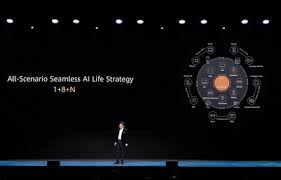Source: finance.yahoo.com
SINGAPORE, Feb. 24, 2020 /PRNewswire/ — Microsoft today awarded Team Hollo from Hong Kong and Nutone from Japan the top prize following an intense finale against 8 other teams across the region at the 2020 Imagine Cup Asia finals.
The competition is designed to inspire students to use their imagination and passion for technology to create innovative solutions that tackle some of the world’s biggest social, environmental, and health challenges.
Team Nutone from Japan and Team Hollo from Hong Kong captured the attention of the judges by harnessing Microsoft’s Azure Machine Learning and Cognitive Technologies to create solutions that provide greater accessibility, health and wellness to individuals and communities. Team Nutone developed a neck wearable EL (Electrolarynx) that restores the ability to speak for people who have lost their voices. Team Hollo developed a mental health companion and therapist all in one platform for at-risk youth.
Runner-up places were awarded to Team Zest from Singapore, Team Blume from India and Team Tulibot from Indonesia who will receive USD2,500 for their innovative projects.
- Team Zest developed Dr. Rehab, a mobile application that provides real-world physiotherapy supervision by medical professionals through computer vision
- Team Tulibot developed Tulibot, an integrated assistive device to bridge the communication gap for the hearing impaired. The technology features a wearable smart glove and glasses
- Team Blume developed an android application that allows patients to scan the RFID tag on prescription medication to ensure its authenticity and allergen-compatibility with the patient
In a first for the annual competition, this year’s Imagine Cup Asia Finals was held via Microsoft Teams and saw the 10 finalists from seven countries virtually present their inventions to secure a place in the World Championships in May.
This year’s winners, Team Hollo and Team Nutone have each received a cash prize of USD8,000, Azure credits and a trip to the global finals to be held at Microsoft Build 2020. Both teams will compete with winners from Americas and Europe, Middle East and Africa (EMEA) for the Imagine Cup trophy along with a cash prize of USD100,000, a mentoring session with Satya Nadella, Chief Executive Officer, Microsoft Corp and a USD50,000 Azure Grant.
“Microsoft’s Imagine Cup competition not only challenges students to utilize technology creatively to make a difference in the world, but also provides the opportunity to connect, engage, and learn from a community of like-minded young innovators. We’re glad to see student teams from across Asia showcase their unique solutions that have the potential to create lasting impact. We hope that through this competition, students are inspired to pursue their passion to develop, ideate, and solve global problems through the power of technology,” said Jennifer Ritzinger, General Manager, Audience Evangelism, Microsoft.
The 10 finalist student teams – from Japan, Singapore, Nepal, Indonesia, India, Mainland China and Hong Kong – were selected from various rounds of the competition online or through in-person National Final events organized by Microsoft subsidiaries in countries across the Asia region.
The competition’s online judging panel included executives from Microsoft and industry leaders. They evaluated the teams on innovation, and whether each solution presented was comprehensive and marketable. The judges were:
- Craig Dixon, Co-Founder, Entrepreneur in Residence and Program Director, Acceleration Asia
- Leanne Robers, Co-Founder and Co-CEO, She Loves Tech
- Jennifer Ritzinger, General Manager, Audience Evangelism, Microsoft
- Vanessa Ching, Founder – XR Alliance, Brand Engineer – GeoWorks
- Andrea Della Mattea, President, Asia Pacific, Microsoft
Held annually since 2003, the Microsoft Imagine Cup is the world’s premier student technology competition, affectionately known by participants as the “Olympics of student technology competitions”. This year’s Imagine Cup encouraged participants to “Dream it. Build it. Live it” in order to create applications that shape how individuals live, work and play and through their creativity, passion and knowledge of technology.

